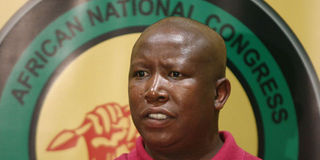S.Africa's ANC suspends Malema for five years

South Africa's ruling African National Congress suspended firebrand youth leader Julius Malema for five years, after finding him guilty of provoking serious divisions within the party November 10, 2011. FILE
South Africa's ruling ANC suspended firebrand youth leader Julius Malema for five years for provoking divisions in the party Thursday, a move that boosts President Jacob Zuma's re-election bid.
Malema, who did not attend the reading the of the verdict, was found guilty of three of the four charges against him, said Derek Hanekom, who headed the disciplinary hearings for the African National Congress.
"The respondant shall vacate his position as the president of the ANC Youth League," he said.
Unless the suspension is reduced on appeal, the decision means thatMalema, 30, would be too old to return as the head of the Youth League if he returns to the party in five years.
Malema became president of the Youth League three years ago and quickly emerged as a key ally for Zuma, who won 2009 elections after orchestrating the party's ouster of former president Thabo Mbeki the year before.
But since then, Malema's allegiances shifted and he began praising Mbeki as a better leader than Zuma -- remarks that resulted in one of his convictions Thursday.
He was also convicted of disrupting a national ANC meeting, and of bringing the party into disrepute by calling for "regime change" in democratic Botswana.
Malema's misconduct had "a negative impact on international and inter-state relations, and would be prejudicial to South Africa as a whole," Hanekom said.
"Such disobedience undermined the effectiveness of the ANC," he said.
Malema was, however, found not guilty of sowing racism by calling for resettling white-owned farms with blacks, an effort the government has already undertaken to redress apartheid-era injustices.
Streets surrounding the ANC headquarters in downtown Johannesburg were closed for the verdict, with heavy police patrols aiming to prevent another outbreak of the violence that marred the opening of Malema's hearings.
Few Malema supporters were seen on the streets of Johannesburg, but eNews channel reported that about 500 rallied to support him at a university campus in the northern town of Polokwane, where he was taking a political science 101 exam.
The Youth League spokesman Floyd Shivambu was also suspended for three years for bringing the party into disrepute with the Botswana statements as well as for swearing at a journalist.
Four other top Youth League officials were also found guilty on various charges, but were granted suspended sentences -- meaning they retain their memberships unless they are convicted of a new offense.
But analysts warned that Malema's suspension from the ANC would do little to mend divisions in the party.
"In recent years, the ANC has become so divided and factionalised that it afforded ample political opportunity to the young and ambitious Malema," said Fiona Forde, author of a new book about Malema.
"While Malema faces a harsh disciplinary sentence, the ANC must also take responsibility for the state of affairs that they have indulged. By and large, they have sat back these past three years and allowed this debacle to unfold," she said.
"But beyond the ANC, South Africa's socio-economic climate was also ideal for a man of Malema's populist politics to emerge. The country is dangerously divided along social and economic lines."
Steven Friedman, head of the centre for the study of democracy at Rhodes University, said that the faction of the ANC who backed Malema could find a new vehicle to express their populist views on issues like nationalising mines, which Malema vocally supported.
"Malema is neither powerful nor popular. He owes his position not to massive support but to the fact that he is useful to one of the factions who are contesting for power in the ANC -- the 'nationalist' or 'populist' group," he wrote in the New Age newspaper.




